英语语法大攻克--现在完成时
- 格式:doc
- 大小:28.00 KB
- 文档页数:2
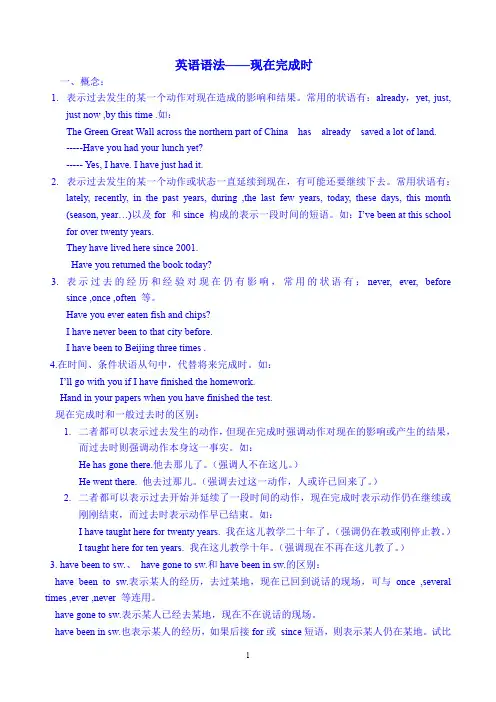
英语语法——现在完成时一、概念:1.表示过去发生的某一个动作对现在造成的影响和结果。
常用的状语有:already,yet, just,just now ,by this time .如:The Green Great Wall across the northern part of China has already saved a lot of land.-----Have you had your lunch yet?----- Yes, I have. I have just had it.2.表示过去发生的某一个动作或状态一直延续到现在,有可能还要继续下去。
常用状语有:lately, recently, in the past years, during ,the last few years, today, these days, this month (season, year…)以及for 和since 构成的表示一段时间的短语。
如:I’ve been at this school for over twenty years.They have lived here since 2001.Have you returned the book today?3.表示过去的经历和经验对现在仍有影响,常用的状语有:never, ever, beforesince ,once ,often 等。
Have you ever eaten fish and chips?I have never been to that city before.I have been to Beijing three times .4.在时间、条件状语从句中,代替将来完成时。
如:I’ll go with you if I have finished the homework.Hand in your papers when you have finished the test.现在完成时和一般过去时的区别:1.二者都可以表示过去发生的动作,但现在完成时强调动作对现在的影响或产生的结果,而过去时则强调动作本身这一事实。


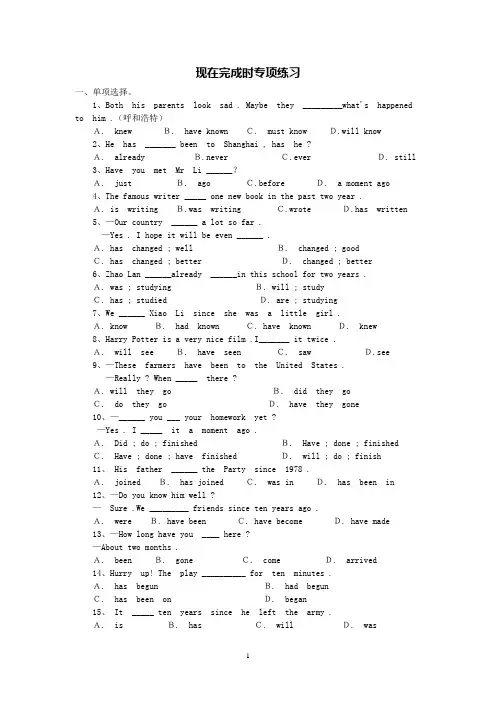
现在完成时专项练习一、单项选择。
1、Both his parents look sad . Maybe they _________what's happened to him .(呼和浩特)A. knew B. have known C. must know D.will know2、He has _______ been to Shanghai , has he ?A. already B.never C.ever D. still 3、Have you met Mr Li ______?A. just B. ago C.before D. a moment ago4、The famous writer _____ one new book in the past two year .A. is writing B.was writing C.wrote D.has written5、—Our country ______ a lot so far .—Yes . I hope it will be even ______ .A. has changed ; well B. changed ; goodC. has changed ; better D. changed ; better6、Zhao Lan ______already ______in this school for two years .A. was ; studying B. will ; studyC. has ; studied D. are ; studying7、We ______ Xiao Li since she was a little girl .A. know B. had known C. have known D. knew8、Harry Potter is a very nice film .I_______ it twice .A. will see B. have seen C. saw D.see9、—These farmers have been to the United States .—Really ? When _____ there ?A. will they go B. did they goC. do they go D. have they gone10、—______ you ___ your homework yet ?—Yes . I _____ it a moment ago .A. Did ; do ; finished B. Have ; done ; finishedC. Have ; done ; have finished D. will ; do ; finish11、 His father ______ the Party since 1978 .A. joined B. has joined C. was in D. has been in12、—Do you know him well ?— Sure .We _________ friends since ten years ago .A. were B. have been C. have become D. have made13、—How long have you ____ here ?—About two months .A. been B. gone C. come D. arrived14、Hurry up! The play __________ for ten minutes .A. has begun B. had begunC. has been on D. began15、 It _____ ten years since he left the army .A. is B. has C. will D. was16、 Miss Green isn't in the office . she_______ to the library .A.has gone B. went C.will go D. has been17、My parents ______ Shandong for ten years .A. have been in B. have been toC. have gone to D. have been18、The students have cleaned the classroom, ?A. so theyB. don’t theyC. have theyD. haven’t they19、 has Mr White been a member of Greener China since he toChina?A. How soon, comesB. How often, gotC. How long, cameD. How far, arrived20、 His uncle for more than 9 years.A. has come hereB. has started to workC. has lived thereD. has left the university二、句型转换。

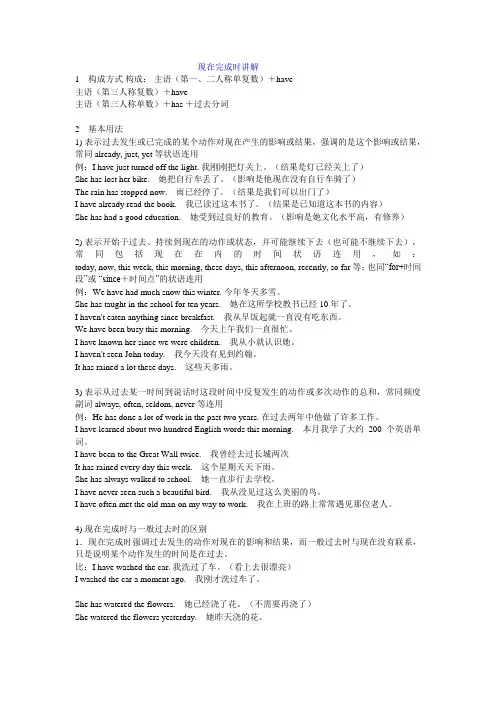
现在完成时讲解1构成方式构成:主语(第一、二人称单复数)+have主语(第三人称复数)+have主语(第三人称单数)+has +过去分词2基本用法1) 表示过去发生或已完成的某个动作对现在产生的影响或结果,强调的是这个影响或结果,常同already, just, yet等状语连用例:I have just turned off the light. 我刚刚把灯关上。
(结果是灯已经关上了)She has lost her bike.她把自行车丢了。
(影响是他现在没有自行车骑了)The rain has stopped now.雨已经停了。
(结果是我们可以出门了)I have already read the book.我已读过这本书了。
(结果是已知道这本书的内容)She has had a good education.她受到过良好的教育。
(影响是她文化水平高,有修养)2) 表示开始于过去、持续到现在的动作或状态,并可能继续下去(也可能不继续下去),常同包括现在在内的时间状语连用,如:today, now, this week, this morning, these days, this afternoon, recently, so far等;也同“for+时间段”或“since+时间点”的状语连用例:We have had much snow this winter. 今年冬天多雪。
She has taught in the school for ten years.她在这所学校教书已经10年了。
I haven't eaten anything since breakfast.我从早饭起就一直没有吃东西。
We have been busy this morning.今天上午我们一直很忙。
I have known her since we were children.我从小就认识她。
I haven't seen John today.我今天没有见到约翰。
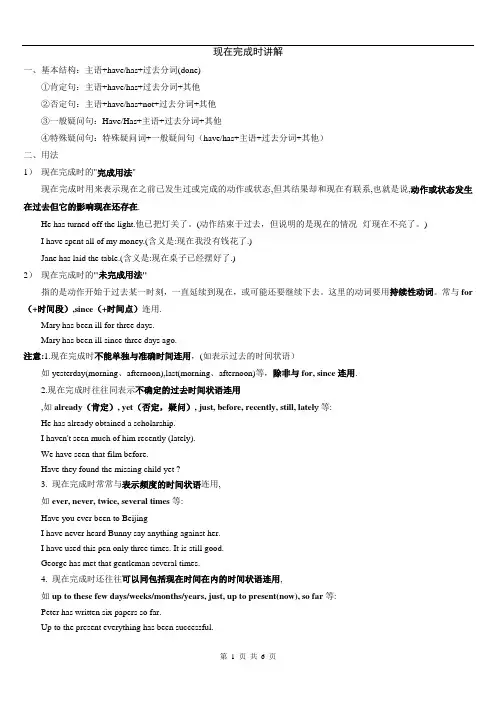
现在完成时讲解一、基本结构:主语+have/has+过去分词(done)①肯定句:主语+have/has+过去分词+其他②否定句:主语+have/has+not+过去分词+其他③一般疑问句:Have/Has+主语+过去分词+其他④特殊疑问句:特殊疑问词+一般疑问句(have/has+主语+过去分词+其他)二、用法1)现在完成时的"完成用法"现在完成时用来表示现在之前已发生过或完成的动作或状态,但其结果却和现在有联系,也就是说,动作或状态发生在过去但它的影响现在还存在.He has turned off the light.他已把灯关了。
(动作结束于过去,但说明的是现在的情况--灯现在不亮了。
)I have spent all of my money.(含义是:现在我没有钱花了.)Jane has laid the table.(含义是:现在桌子已经摆好了.)2)现在完成时的"未完成用法"指的是动作开始于过去某一时刻,一直延续到现在,或可能还要继续下去。
这里的动词要用持续性动词。
常与for (+时间段),since(+时间点)连用.Mary has been ill for three days.Mary has been ill since three days ago.注意:1.现在完成时不能单独与准确时间连用,(如表示过去的时间状语)如yesterday(morning、afternoon),last(morning、afternoon)等,除非与for, since连用.2.现在完成时往往同表示不确定的过去时间状语连用,如already(肯定), yet(否定,疑问), just, before, recently, still, latel y等:He has already obtained a scholarship.I haven't seen much of him recently (lately).We have seen that film before.Have they found the missing child yet ?3. 现在完成时常常与表示频度的时间状语连用,如ever, never, twice, several times等:Have you ever been to BeijingI have never heard Bunny say anything against her.I have used this pen only three times. It is still good.George has met that gentleman several times.4. 现在完成时还往往可以同包括现在时间在内的时间状语连用,如up to these few days/weeks/months/years, just, up to present(now), so far等:Peter has written six papers so far.Up to the present everything has been successful.5. 现在完成时还可以用来表示过去的一个时间到现在这段时间内重复发生的动作.We have had four texts this semester.6. have been to 和have gone to的区别have been to 强调“去过”,现已不在那里,如:He has been to the USA three times.他到美国去过三次。
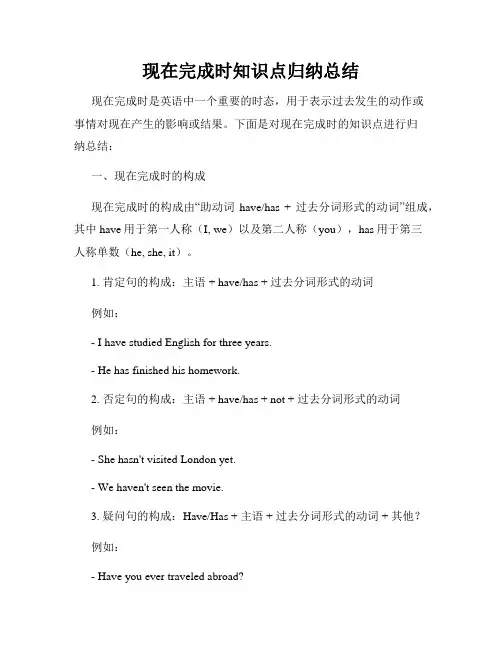
现在完成时知识点归纳总结现在完成时是英语中一个重要的时态,用于表示过去发生的动作或事情对现在产生的影响或结果。
下面是对现在完成时的知识点进行归纳总结:一、现在完成时的构成现在完成时的构成由“助动词have/has + 过去分词形式的动词”组成,其中have用于第一人称(I, we)以及第二人称(you),has用于第三人称单数(he, she, it)。
1. 肯定句的构成:主语 + have/has + 过去分词形式的动词例如:- I have studied English for three years.- He has finished his homework.2. 否定句的构成:主语 + have/has + not + 过去分词形式的动词例如:- She hasn't visited London yet.- We haven't seen the movie.3. 疑问句的构成:Have/Has + 主语 + 过去分词形式的动词 + 其他?例如:- Have you ever traveled abroad?- Has she lived in this city before?二、现在完成时的用法1. 表示过去的行动或事件对现在的影响或结果。
例如:- She has lost her keys. (她现在找不到她的钥匙。
)- He has worked hard, so he is tired. (他过去努力工作,所以他现在很累。
)2. 表示从过去某个时间开始一直持续到现在的动作或状态。
例如:- They have lived in the same house for 10 years. (他们从10年前开始就一直住在同一栋房子里。
)- I have known him since we were kids. (我从我们还是孩子的时候就认识他了。
)3. 表示过去经历的事情或已经完成的动作。
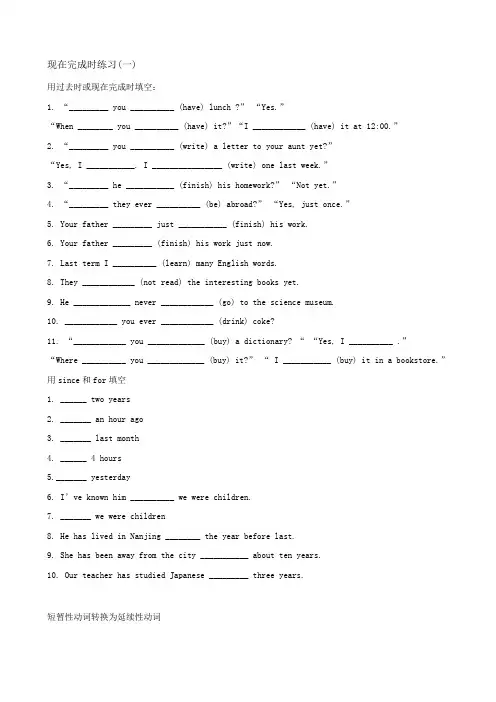
现在完成时练习(一)用过去时或现在完成时填空:1. “_________ you __________ (have) lunch ?” “Yes.”“When ________ you __________ (have) it?”“I ____________ (have) it at 12:00.”2. “_________ you __________ (write) a letter to your aunt yet?”“Yes, I ___________. I ________________ (write) one last week.”3. “_________ he ___________ (finish) his homework?” “Not yet.”4. “_________ they ever __________ (be) abroad?” “Yes, just once.”5. Your father _________ just ___________ (finish) his work.6. Your father _________ (finish) his work just now.7. Last term I __________ (learn) many English words.8. They ____________ (not read) the interesting books yet.9. He _____________ never ____________ (go) to the science museum.10. ____________ you ever ____________ (drink) coke?11. “____________ you _____________ (buy) a dictionary? “ “Yes, I __________ .”“Where __________ you _____________ (buy) it?” “ I ___________ (buy) it in a bookstore.”用since和for填空1. ______ two years2. _______ an hour ago3. _______ last month4. ______ 4 hours5._______ yesterday6. I’ve known him __________ we were children.7. _______ we were children8. He has lived in Nanjing ________ the year before last.9. She has been away from the city ___________ about ten years.10. Our teacher has studied Japanese _________ three years.短暂性动词转换为延续性动词①arrive at/in s w. get to/reach sw. come/go/move to sw.→ be in sw./at school/at home/on the farm/be here/be there1) He got to Beijing five minutes ago.He ________ _________ _________ Beijing for _________ _________.2) I moved to the USA last year.I ________ ________ __________ the USA since __________ __________.3) I went home yesterday.I _______ ________ _________ home for _________ __________.4) They came here last week.They _________ _________ here since _________ __________.②come/go back, return → be back come/go out → be out1) He came out two years ago.He _________ __________ _________ for __________ __________.2) We return to Fuzhou yesterday.We ________ ________ _________ to Fuzhou since __________.翻译下列句子1.我以前从来没去过那个农场。
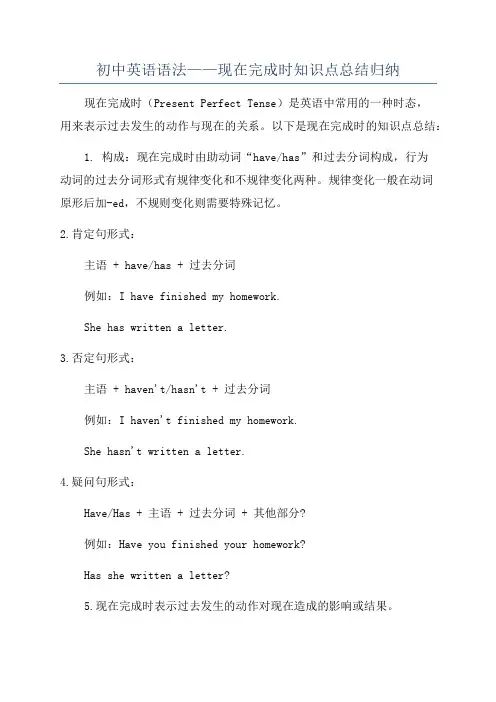
初中英语语法——现在完成时知识点总结归纳现在完成时(Present Perfect Tense)是英语中常用的一种时态,用来表示过去发生的动作与现在的关系。
以下是现在完成时的知识点总结:1. 构成:现在完成时由助动词“have/has”和过去分词构成,行为动词的过去分词形式有规律变化和不规律变化两种。
规律变化一般在动词原形后加-ed,不规则变化则需要特殊记忆。
2.肯定句形式:主语 + have/has + 过去分词例如:I have finished my homework.She has written a letter.3.否定句形式:主语 + haven't/hasn't + 过去分词例如:I haven't finished my homework.She hasn't written a letter.4.疑问句形式:Have/Has + 主语 + 过去分词 + 其他部分?例如:Have you finished your homework?Has she written a letter?5.现在完成时表示过去发生的动作对现在造成的影响或结果。
例如:I have lost my key.(我丢失了我的钥匙,现在找不到了。
)He has broken his leg.(他折断了腿,现在不能走路。
)6.现在完成时还可以用来表示一直延续到现在的动作或状态。
例如:I have lived in this city for five years.(我已经在这个城市住了五年了。
)She has known him since high school.(她从高中就认识他了。
)7.现在完成时与时间状语的连用:现在完成时通常与以下时间状语连用:just(刚刚)、already(已经)、yet(还)、ever(曾经)、never(从未)、recently(最近)、since(自从)、for(持续时间)例如:I have just finished my homework.(我刚完成了作业。

高考英语语法专题复习——现在完成时1.现在完成时的概念现在完成时指的是过去的动作或状态持续到了现在,对现在造成的影响,可能会持续发生下去。
现在完成时的标志词主要有:already已经、yet尚未(放于否定句和一般疑问句句末)、before在…之前、just刚刚和ever曾经;不断;总是。
2. 现在完成时的动词过去分词的变化规则(1)直接加ed,如:worked,played;(2)以不发音的e结尾,直接加d,如:lived,tasted;(3)辅音+y结尾,去y改i+ed,如:studied,fried;(4)重读闭音节结尾,双写最后一个辅音字母+ed,如:stopped,planned;(5)以c结尾,变c为ck+ed,如:picnic-picnicked,traffic-trafficked;(6)不规则变化,如:bring-brought,cut-cut,drive-driven;3.现在完成时的句型结构(1)基本结构:主语+have/has+动词的过去分词(p.p)(V-ed)现在完成时的基本构成方式是用动词have加上过去分词。
它是用来表达过去发生事情的另一种方式。
He has lost his wallet.他的钱包丢了。
She has had lunch,so she is not hungry now.她已经吃过午餐了。
We have seen that film before.之前我们已经看过那部电影了。
I have just finished my homework.我刚刚完成我的家庭作业。
(2)肯定句:主语+have/has+动词的过去分词(p.p)(V-ed)+宾语(have/has done)例句:I have told her the truth.我已经告诉了她真相。
I have found my schoolbag.我已经找到了我的书包。
We've had too much rain this year.今年雨水太多。
英语现在完成时语法现在完成时是英语中常用的时态,在表达时代、时间及行为发生的先后顺序上起着重要作用。
现在完成时的使用可以把时间跨越的行为及状态的发生顺序表示出来,这对于交流及表达非常有用。
现在完成时的结构是:[have/has +去分词],主要由助动词‘have’‘has’与过去分词(V-ed)构成。
这两部分一起构成一个完整的句子,并能够表达出过去从某一时间点开始到现在仍在持续的动作或状态。
现在完成时的句子可以分为两类:带有经过的句子和无经过的句子。
它们使用的助动词是不同的。
带有经过的句子用‘have’,而无经过的句子用‘has’,并且它们的主语也是不同的。
带有经过的句子的主语必须是复数,而无经过的句子的主语可以是复数或单数。
带有经过的现在完成时句子可用来表示从过去,一直持续到现在的动作或状态,或曾经发生过但带有持续结果的动作或状态,也可以用来表示一连串的动作或概括过去发生的若干动作。
例如:He has lived in Beijing for over five years.(他在北京住了超过五年了。
)She has visited many countries.(她曾经去过许多国家。
)My parents have had two cars since they moved in this house.(自从我父母搬进这所房子以来,他们有两辆车了。
)由于它具有持续结果,现在完成时也可以用来表达当下与过去某一时间点有关的行为或状态。
例如:He has been a teacher for three years.(他当了三年老师。
) I have known her since I was 8.(我从8岁起就认识她。
) They have been working on this project since Tuesday.(他们从周二起开始工作在这个项目上。
此外,现在完成时也可以用来表示以前发生的一系列的动作,表示时间及频率未明确指出的时候也可以使用。
现在完成时的讲解基本结构:主语+have/has+过去分词(done)①肯定句:主语+have/has+过去分词+其他②否定句:主语+have/has+not+过去分词+其他③一般疑问句:Have/Has+主语+过去分词+其他④特殊疑问句:特殊疑问词+一般疑问句(have/has+主语+过去分词+其他)(1)现在完成时用来表示现在之前已发生过或完成的动作或状态,但其结果却和现在有联系,也就是说,动作或状态发生在过去但它的影响现在还存在.I have spent all of my money.(含义是:现在我没有钱花了.)Jane has laid the table.(含义是:现在桌子已经摆好了.)Michael has been ill.(含义是:现在仍然很虚弱)He has returned from abroad. (含义是:现在已在此地)(2)现在完成时可以用来表示发生在过去某一时刻的,持续到现在的动作(用行为动词表示)或状态(be动词表示)常与for(+时间段),since(+时间点或过去时的句子)连用.Mary has been ill for three days.I have lived here since 1998.注(超重要):瞬间动词(buy,die,join,lose……)不能直接与for since 连用。
要改变动词 come-bego out-be outfinish-be overopen-be opendie-be dead………………1.have代替buyMy brother has had(不能用has bought) this bike for almost four years.2、用keep或have代替borrowI have kept(不能用have borrowed) the book for quite a few days.3、用be替代becomeHow long has your sister been a teacher?4、用have a cold代替catch a coldTom has had a cold since the day before yesterday.5、用wear代替put onb)用“be+形容词”代终止性动词1、be+married代marry2、be+ill代fall (get) ill3、be+dead代die4、be+asleep代fall (get) asleep5、be+awake代wake/wake up6、be+gone代lose,die,sell,leave7、be+open代open 8、be closed代close/shut9、be+missing(gone,lost)代losec)用“be+副词”代终止性动词1“be+on”代start,begin2“be+up”代get up3“be+back(to)”代return to,come back to,go back to4“be here (there)”代come(arrive,reach,get) here或go (arrive,reach,get) there等等d)用“be+介词短语”代终止性动词1.“be in/at +地点”代替go to /come to2.用be in the army 代替join the army3.“be in/at +地点”代替move to常用瞬间动词变延续性动词表:1. have arrived at/in sw. got to/reached sw. come/gone/moved to sw.→have been in sw./at…相应的介词2. have come/gone back/returned → have been back3. have come/gone out →have been out4. have become → have been5. have closed / opened→ have been close/open6. have got up → have been up;7. have died → have been dead;8. have left sw. → have been away from sw.9. have fallen asleep/got to sleep → have been asleep;10. have finished/ended/completed → have been over;11. havemarried → have been married;12. have started/begun to do sth. → have done sth. ;13. have begun → have been on14. have borrowed/bought →have kept/had15. have lost → haven’t had16. have put on →have worn17. have caught /get a cold → have had a cold;18. have got to know → have known19. have/has gone to → have been in20. have joined/have taken part in the league/the Party/the army→have been a member of/ have been in/have been the Party’s member/the league member/the soldier…注意: 1.现在完成时不能单独与准确时间连用,(如表示过去的时间状语)如yesterday(morning、afternoon),last(morning、afternoon)等,除非与for,since连用.2.现在完成时往往同表示不确定的过去时间状语连用,如already(肯定), yet(否定,疑问), just, before, recently,still, lately等:He has already obtained a scholarship.I haven't seen much of him recently (lately).We have seen that film before.Have they found the missing child yet ?3. 现在完成时常常与表示频度的时间状语连用,如often, sometimes, ever, never, twice, on several occasion等:Have you ever been to BeijingI have never heard Bunny say anything against her.I have used this pen only three times. It is still good.George has met that gentleman on several occasions.4. 现在完成时还往往可以同包括现在时间在内的时间状语连用,如now, up to these few days/weeks/months/years, this morning/week/month/year, just, today, up to present, so far等:Peter has written six papers so far.Man has now learned to release energy from the nucleus of the atom.There has been too much rain in San Francisco this year.The friendly relations and cooperation between our two countries have been enhanced inthe past few years.Up to the present everything has been successful.5. 现在完成时还可以用来表示过去的一个时间到现在这段时间内重复发生的动作.We have had four texts this semester.6.现在完成时的"完成用法"现在完成时的"完成用法"指的是动作发生在过去某一时刻并已结束,但该动作对现在产生了影响,与现在情况具有因果关系。
现在完成时态和过去完成时态一.现在完成时态:1.定义:表示从过去某一时间开始一直持续到现在的动作或状态。
2.构成:助动词Have (has) +动词的过去分词注:has 用于第三人称单数,have 用于其他所有人称。
如:He has come here for ten years. (他来这里已经有十年了。
)He hasn’t come here for ten years. (他来这里没有十年。
)Has he come here for ten years? (他来这里已经有十年了吗?)Yes, he has. (是的, 有十年了。
)No, he hasn’t.(不,没有十年。
)3.可与现在完成时态连用的词语1)可与宾语从句连用,后接的宾语从句可以用任何时态。
如:Have you known how big the box is? 你知道这个盒子有多大吗?2)与时间状语连用。
它可以和包括现在时间在内的时间状语连用,如:today (今天), this week(这个星期), now(现在),this year(今年), often (经常),sometimes(有时候)。
如:Have you seen him today? 你今天见过他吗?He has lived here for five years now. 到现在他已经在这里住了五年了。
3)与since(自…以来), for(经历), before (在…前), after(在…后)等引导的短语或从句连用。
Since 后面跟具体的时间,或者后面跟一个从句。
如:He has lived here since 1970.(自从1970年以来他就住在这里。
)He has lived here since he came here.(自从他来这里以来就住在这里。
)For后面接表示一段时间的短语。
They have been here for two years.(他们在这里两年了)。
时态练习题有答案1、The violin will have to be tuned before it _____.A. is playedB. should playC. playsD. is being played答案:A. 主句将来式从句现在式,被动,The violin is played. D.项表示正在被,与题意不符2、By the time you arrive in London, we _____ in Europe for two weeks.A. had stayedB. shall stayC. will have stayedD. have been staying答案:C. by the time you arrive 你到达的时候(时间为止),恰好表达到将来某一时刻为止;主句里有”for two weeks”已两周的时间状语,正好符合“将来完成时表示的”到将来某时刻就已经之意。
3、I ___ with some friends until I find a flat.A, am living B, liveC, have lived D, will have lived答案:A. 表示目前暂时的动作用现在进行时。
句意:我和朋友住在一起是暂时的不是长久的,找到住处我就会搬家4、All the preparations for the task _____, and we’re ready to start.A. completedB. completeC. had been completedD. have been completed答案:D. 首先,名词preparations 与动词complete 是动宾关系,应用被动语,排除A,B 项。
C项是过去完成时表示过去的过去,而本句的意思是“现已准备好,马上就要开始。
”与现在有关系,因此用现在完成时。
5、I thought I ____ the door, but it is still openA, had closed B, was closingC, have closed D, would close答案:A. 此题close(关闭)发生在thought 之前,用过去完成时, 表示发生在过去的过去6、You ____ television. Why not do something more active?A. always watch B are always watchingC have always watchedD have always been watching答案:B. 有时现在进行时可以表示对人或事不满、责备或赞扬。
八年级下册必考知识点---现在完成时现在完成时(I)语法知识定义:(1)表示过去发生或已经发生的动作对现在造成的影响或结果,这个影响和结果对现在还必须存在.常与already(已经), yet(已经,还), just(刚刚),ever(曾经),never 等词连用.常用于肯定句或疑问句(均表示:已经).常用于否定句(表示:还、尚),疑问句末尾(表示:已经).现在完成时的构成及句型结构:(注:过去分词的变化分规则变化与不规则变化,规则变化与动词原形变过去式一样,不规则变化见教材最后面)1.肯定句:主语+have/has+过去分词+其他+时间.eg: I have already lost the key. 我已经弄丢了钥匙. (我现在没有钥匙) He has ever read that book . 他曾经看过这本书. (了解书的内容)They have just cleaned their hands. 他们刚刚洗过手了. (手是干净的)2.否定句:主语+haven’t/ hasn’t+过去分词+其他+时间.eg: I haven’t lost the key yet.He hasn’t ever read that book .They haven’t just cleaned their hands.3.一般疑问句:Have/Has+主语+过去分词+其他+时间?肯定回答:Yes, 主语+have/ has. 否定回答:No, 主语+haven’t/hasn’t. eg: Have you already lost the key? Yes, I have. No, I haven’t. Has he ever read the book? Yes, he has. No, he hasn’t.Have they just cleaned their hands? Yes, they have. No, they haven’t.4.特殊疑问句:特殊疑问词+have/has+主语+过去分词+其他+时间?eg: What have you already done? (done是do/does的过去分词)What has he ever done?What have they just done?定义:(2)现在完成时表示从过去开始一直持续到现在还有可能继续持续下去的动作或状态。
现在完成时
1. Kate’s never seen Chinese films,____ ?
A. hasn’t she
B. has she
C. isn’t she
D. is she
2. -Ann has gone to Shanghai.
-So ______her parents.
A. has
B. had
C. did
D. have
3. -Mum, may I go out and play basketball?
______you______ your homework yet?
A. Do;finish
B. Are;finishing
C. Did;finish
D. Have;finished
4. -______ you ______anywhere before?
-Yes, but I can’t remember where I______
A. Did;surf;surfed
B. Have;surfed;surfed
C. Did;surf;have surfed
D. Have;surfed;have surfed
5. His brother has been to Stone Forest twice______he came to Yunnan.
A. after
B. before
C. since
D. for
6. Tom______the CD player for two weeks.
A. has lent B. has borrowed C. has bought D. has had
7. I______a letter from him since he left.
A. didn’t receive
B. haven’t got
C. didn’t have
D. haven’t heard
8. -Have you ever______Beijing to see the Forbidden City?
-Yes, I have.
A. went to
B. gone to
C. been in
D. been to
9. My parents ______ Shangdong for ten years.
A. have been in
B. have been to
C. have gone to
D. have been
10. I won’t go to the concert because I ____my ticket.
A. lost
B. don’t lose
C. have lost
D. is coming
11. – Where is Mr Liu? - He________ the library.
A. has been to
B. has gone to
C. has been in
D.has went
12. The cleaners have cleaned the streets, ________?
A. so they
B. don’t they
C. have they
D. haven’t they
13. I like Beijing. I________ there three times.
A. went
B. go
C. have been
D. have gone
14.We came to Shanghai three years ago, so we_______here for two years.
A. have been to
B. have been in
C. have been
D. have gone
15.- How long_______you _______your exam paper? - About three months.
A. did;buy
B. have;get
C. have;had
D. have;bought
16. He tells me he ________China for over eight years.
A. has been
B. has been in
C. has been to
D. has gone to
17.____has Mr. Brown been a member of the party since he_____to China?
A. How soon;comes
B. How often;got
C. How long;came
D. How far;arrived
18. His parents________ for more than 3 years.
A. have come here
B. have started to work
C. have lived there
D. have left the university
答案:1.B 2.D 3.D 4.D 5.C 6. D 7.B 8.D 9.A 10.C 11.A 12.D 13. C 14.C15 C16.B 17.C 18.C。